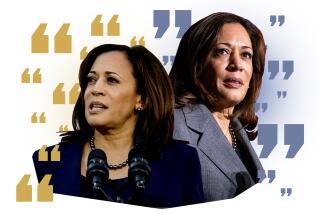The Debate Within Willie Brown
- Share via
SACRAMENTO — We now move into the inner sanctum of Assembly Speaker Willie Brown. A debate is in progress. Two academicians from the School of Angry White Guys intend to place on the November, 1996, ballot a proposition that, in essence, would eliminate public-sector affirmative action programs. Brown wants it beaten, and at issue now is what role he should play in the fight.
On one side is Willie Brown, the former shoeshine boy from Mineola, Tex. “The real Willie Brown,” he says. This Willie Brown can recall those customers who found it sporting to make him fish quarter tips out of a spittoon. He can recall Jim Crow laws, not just the letter, but also--more relevant to this discussion--the spirit. And he can recall helping hands on the climb out. This Willie Brown wants to lead the fight, and take it straight to the gut issue: “Race.”
On the other side is “the practical, political Willie Brown.” This is the master of tactics and compromise who has pretty much run Sacramento for 15 years, accumulating a trainload of baggage along the way. This Willie Brown knows too well his own notoriety, calling himself the “picture poster boy of term limits.” His opponents would relish making their so-called civil rights initiative a referendum on this Willie Brown. He does not want to give them the chance.
“I play with reality,” he says. “. . . And I want to win.”
*
Late last year, when the affirmative action rollback first appeared on the political radar, Brown found himself cast as its most adamant and articulate opponent. He publicly counseled President Clinton not to pussyfoot around on the issue, but to take it on head-on. He wrote and circulated a 48-page policy paper, tracing the evolution of affirmative action from the 13th Amendment forward. He appeared on national television interview shows to debate Pat Buchanan and others.
In these efforts, Brown evoked a passion that ran strikingly counter to his image as the ultimate Sacramento wheeler-dealer. Gone was the faint whiff of cynicism that sometimes floats at the edges of his statehouse oratory. This one was personal, and that produced heat. The heat was on display in a debate last month at McGeorge Law School. Brown devoured the initiative promoters. At one point, he even forced them to admit they had no evidence to support a need for the measure.
“I believe,” Brown scolded them, “that your position is so flawed, with a lack of data and a lack of information and a lack of clarity of thought, that it comes from a space and place in this nation that is very, very troubling. It is what put in place the Jim Crow laws. . . . It is a reaffirmation of every single, solitary discriminatory sanction that this country ever tolerated, and you ought to re-examine yourself.”
It was a wonderful performance, and on reflection Brown fears it was, well, too wonderful. “An unfair fight,” he said. Overkill. Which takes Brown back to his dilemma. He is the best person to step forward and take down this initiative, and he is also the worst. He has lived racial discrimination and knows more about affirmative action than those who would presume to kill it. Still, he is Willie Brown, self-described Republican “whipping boy. . . . There are some definite opinions about Willie Brown, which means that whatever Willie Brown says on an issue may never be heard. Their opinions would block it out. I don’t want that to be the fate of this civil rights issue.”
*
The political Willie Brown argues that the initiative should be cast as a battle between “white women and the rest of the world.” He envisions television commercials with Angela Lansbury. He also can imagine Willie Nelson spots on country radio. He anticipates corporate leaders will rise up to defend their affirmative action programs, pressuring Republican leaders who love corporate contributions to at least keep quiet on the issue.
It was this Brown who early last week told reporters the “debate needs to move away from this black face.” He mentioned, for example, Elizabeth Dole, the former Republican Cabinet official who sponsored the Glass Ceiling Report on working women.
But now the real Willie Brown sits in his office and argues there is no way he can sit out the battle: “I am not going to be given a pass, and I don’t want to be given a pass. . . . I don’t know of anybody who would be better to articulate our side of the issue. And until I do find somebody I will continue to make the case. And I think I do make the case.”
This Willie Brown remembers what happened with Proposition 187, when so many Democratic politicians hedged and ducked and stood by as “wallflowers.” This Willie Brown also remembers life in the “colored section” of Mineola, Tex. The debate continues.
More to Read
Get the L.A. Times Politics newsletter
Deeply reported insights into legislation, politics and policy from Sacramento, Washington and beyond. In your inbox twice per week.
You may occasionally receive promotional content from the Los Angeles Times.








